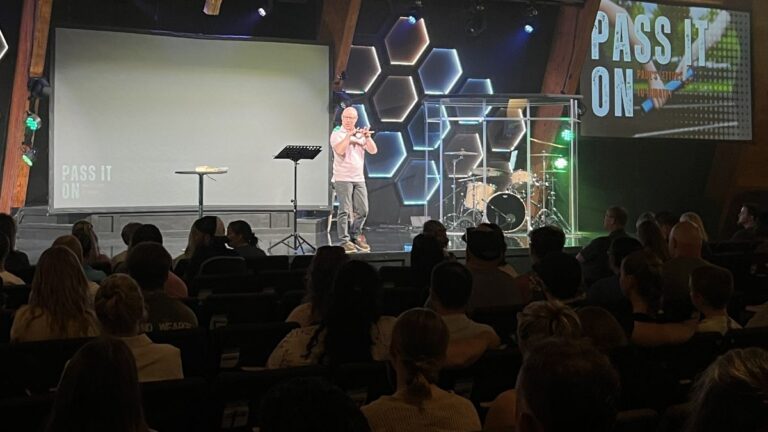After Emily Crawford had a stroke at age 52, she found herself in a nursing home with roommates and peers who were sometimes four decades older. Her children had to visit before the doors closed at 5 p.m. and it was difficult to find ways to stay engaged.
When her mom, Barbara Harper, visited, Crawford would ask, “Why can’t I just get in the car with you today (and go home)?”
Three years later, with the help of a federally funded transition program called Homeward Bound, Crawford finally did just that. She now lives with Harper in Falmouth, where she’s received funding for home modifications and was connected with home health aides.
Crawford said she’s grateful to live in a setting that feels more familiar than the nursing home did. Her mom added that nursing homes provide important services, but Crawford wasn’t ready for “end-of-life care.”
“Oh my goodness, I’m so relieved to be home in a place where my kids can be here,” Crawford said. “It really makes such a difference to have family support. My kids (and) everybody visited me in the nursing home, but it’s not the same as being home.”
Homeward Bound helps seniors and adults with disabilities transition from nursing homes and hospitals back to community-based care settings. The national program is called Money Follows the Person.
As nursing homes close, programs like Homeward Bound could be part of a growing effort to increase opportunities for seniors to age in place and help others with disabilities return to their homes. Maine experts say the future of aging care needs to include options to meet the needs of all seniors.
Harper said she spent a year trying to find a way to bring Crawford home, where she thought her quality of life would be better. Four months ago she connected with Homeward Bound through the Maine Long-Term Care Ombudsman program, and things started coming together. Crawford transitioned home late last month.
“I’m so grateful and so thrilled every single day when I look in this room and see my daughter sitting cross-legged having a cup of coffee or rubbing her dog’s tummy,” Harper said. “I’m the happiest mom in the world.”
Homeward Bound, in its decade of existence, has helped 145 Mainers transition out of long-term care and similar facilities.
That number may seem small but program managers said it’s still a vital service for people who need it.

Senior citizens who move into nursing homes on average live less than two more years, said Lenard Kaye, director of the University of Maine’s Center on Aging. Programs like Homeward Bound offer an avenue for them to return to their homes and communities where they have support systems, he said.
“We know that 80-90% of older adults want to take their last breath in the familiar setting of their home in the neighborhood that they know all too well,” said Kaye, a professor in the University of Maine School of Social Work.
Aging in place is not always the best option for everyone and it’s important to maintain long-term services for those needing a higher level of medical care, Kaye said. But for those who want to and are able to remain at home, transition programs can go a long way to combat what Kaye sees as a “public health emergency” of isolation and loneliness among seniors.
This was a worsening problem before COVID-19 but social distancing during the pandemic escalated it, he said. Now it’s estimated that three out of every four older adults feel isolated.
“Isolation is a threat to one’s health and well-being. It’s been equated with smoking 15 cigarettes a day,” Kaye said. “It shortens your life.”
Seniors who are able to remain near friends, family and longtime neighbors feel more connected to their community and less isolated, he said.
The thought of getting stuck in a facility for the rest of their life can be overwhelming, said Brenda Gallant, Maine’s long-term care ombudsman.

Some Mainers who have transitioned out of facilities through Homeward Bound have gone on to get married and attend college, Gallant said.
“It’s inspiring when you see people that never thought they could go back into the community be successful with the right support and planning,” Gallant said.
To qualify, Homeward Bound applicants must be at least 18 years old, eligible for MaineCare, receiving nursing home level of care and have been in a hospital or nursing home for at least 60 days. The average transition takes six months.
The ombudsman program receives referrals from hospitals and nursing homes. Once the participant is determined to be eligible, the program works with a transition care coordinator to pull together a plan, identify a “qualified residence,” which could be a family member’s home or a group home with four beds or less, and connect them with MaineCare funded home care services. The recipient is actively involved in the planning process.
The state Department of Health and Human Services Office of Aging and Disability provides oversight for the program.
The U.S. Centers for Medicare and Medicaid Services has dedicated more than $10 million for the project since 2012. These funds can be used for household startup costs such as furniture, rent, food and home modifications.
Since 2008, the national program has transitioned more than 107,000 Americans to community living.
“This program layers additional supports and services for individuals who have complex medical needs and require assistance to return to their communities, helping to ensure Maine people have the opportunity to explore receiving care in their homes,” said Jackie Farwell, spokeswoman for Maine DHHS.
Importance of options
However, Maine’s Homeward Bound transitions have been declining in recent years. Last year there was only one due to staffing shortages and the pandemic. This year there’s been one transition.

Last year there were no care coordination agencies in the state available to take on Homeward Bound cases, which is why there was only one transition, said Allison Knight, the Homeward Bound transition manager with the Long-Term Care Ombudsman Program.
The state Department of Health and Human Services this spring hired two care coordinators to address the problem. With them, Knight said she’s doing outreach again and expects the transitions to pick back up.
Even without the federal grant, the ombudsman program continued to help transition people out of a variety of facilities, and back into home- and community-based settings, Knight said.
Another reason the numbers are low is because state regulations require Mainers to demonstrate a high level of need to qualify for nursing homes. Therefore the people trying to transition out of these facilities have a high level of need, which requires a lot of planning and coordination, Gallant said.
“While there might not be thousands of people that we serve every year, it’s important that people have this option and that they be made aware of it, and that we explore their options for being independent, if that’s what they wish,” Gallant said.
In addition, housing shortages and nursing shortages make it difficult to find affordable housing and skilled home services.
“This program is so critical. Even though there are barriers, we work diligently to overcome those barriers,” Gallant said.
Despite the challenges, it’s important to have programs like Homeward Bound because it provides Mainers with more options for their healthcare needs, Kaye said. Over the last 15 to 20 years, there’s been a trend toward systems allowing seniors to remain at home.
The system going forward needs to focus on providing more options. With recent nursing home closures and Maine’s rural nature, seniors sometimes move long distances to transition into long-term care. Instead there should be more options for them to stay in their communities, Kaye said.
For those needing long-term care in a facility, he added, the care needs to be more “person-centered” by better reflecting the personal, humanizing care one would get at home.
“There are a range of alternatives that really have to be available if we’re going to establish a system that is best for everybody concerned because it will recognize that some people want to live in a group setting and others don’t.”
Rose Lundy covers healthcare for The Maine Monitor. Reach her with ideas for other stories: gro.r1755025669otino1755025669menia1755025669meht@1755025669esor1755025669.








